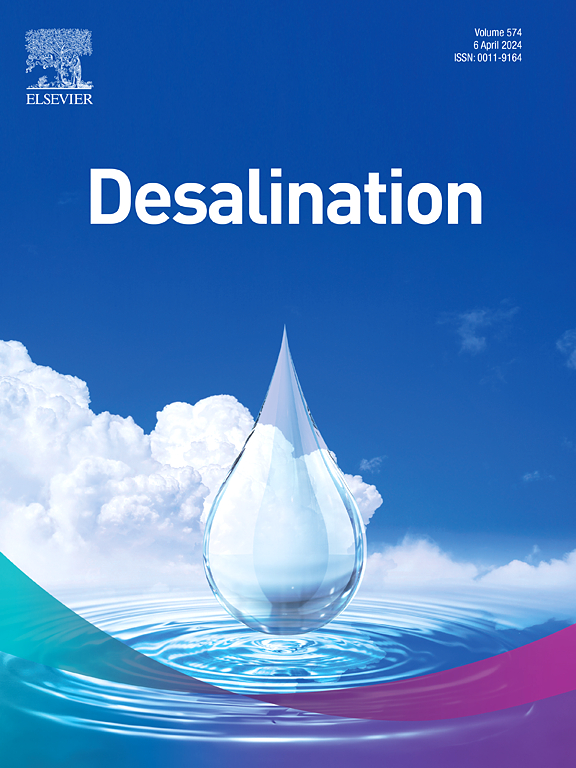Targeting fabrication of a TFC NF membrane for the desalination of sulfate-type brackish water
IF 8.3
1区 工程技术
Q1 ENGINEERING, CHEMICAL
引用次数: 0
Abstract
Nanofiltration (NF) is a promising technology for brackish water desalination due to its tunable separation efficiency and effective removal of organic contaminants. However, the limited diversity of commercial NF membranes hinders optimal performance. To address this, we developed a tailored NF membrane by simultaneously increasing the piperazine (PIP) concentration and decreasing the trimesoyl chloride (TMC) concentration aiming for the treatment of a typical sulfate-type brackish water. The optimized membrane demonstrated superior performance: adequate desalination capability and improved anti-fouling properties. In particular, the NF membrane fabricated with 1.5 %(w/v) PIP and 0.03 %(w/v) TMC exhibited a more compact polyamide structure and superior desalination performance compared to NF270. In comparison to NF90, it presented greater surface hydrophilicity (~40°) and nearly two-fold higher permeation flux. Moreover, it exhibited significantly improved anti-fouling ability, as evidenced by its 99.9 % flux recovery versus NF90's 23.5 % after brine cleaning. This enhancement is attributed to its optimized solute selectivity and surface chemistry, which reduce concentration polarization and foulant adhesion. Our work provides a practical and feasible strategy for customizing NF membrane structures to improve desalination efficiency and sustainability.

为硫酸盐型苦咸水脱盐定向制造 TFC NF 膜
纳滤技术具有分离效率可调、有机污染物去除效果好等优点,是微咸水脱盐的重要技术之一。然而,有限的商业纳滤膜的多样性阻碍了最佳性能。为了解决这个问题,我们通过同时增加哌嗪(PIP)浓度和降低三甲酰氯(TMC)浓度来开发一种定制的NF膜,旨在处理典型的硫酸盐型微咸水。优化后的膜具有良好的脱盐能力和抗污染性能。特别是,与NF270相比,加入1.5% (w/v) PIP和0.03% (w/v) TMC制备的NF膜具有更紧凑的聚酰胺结构和更好的脱盐性能。与NF90相比,它具有更大的表面亲水性(~40°)和近两倍的渗透通量。此外,它的抗污能力显著提高,经盐水清洗后,其通量回收率为99.9%,而NF90的通量回收率为23.5%。这种增强归因于其优化的溶质选择性和表面化学,从而减少了浓度极化和污染物粘附。我们的工作为定制纳滤膜结构以提高脱盐效率和可持续性提供了切实可行的策略。
本文章由计算机程序翻译,如有差异,请以英文原文为准。
求助全文
约1分钟内获得全文
求助全文
来源期刊

Desalination
工程技术-工程:化工
CiteScore
14.60
自引率
20.20%
发文量
619
审稿时长
41 days
期刊介绍:
Desalination is a scholarly journal that focuses on the field of desalination materials, processes, and associated technologies. It encompasses a wide range of disciplines and aims to publish exceptional papers in this area.
The journal invites submissions that explicitly revolve around water desalting and its applications to various sources such as seawater, groundwater, and wastewater. It particularly encourages research on diverse desalination methods including thermal, membrane, sorption, and hybrid processes.
By providing a platform for innovative studies, Desalination aims to advance the understanding and development of desalination technologies, promoting sustainable solutions for water scarcity challenges.
 求助内容:
求助内容: 应助结果提醒方式:
应助结果提醒方式:


